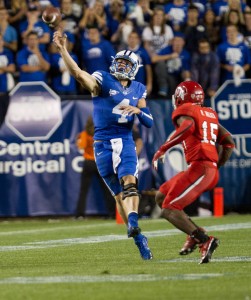The energy, the excitement and the thrill of walking into a LaVell Edwards Stadium filled with red and blue evokes a sense of tradition.

The in-state rivalry between BYU and the University of Utah existed for 91 years, and in recent years the matchup has been intense.
But for the first time since 1945, the rivalry will be on hiatus for the 2014 and 2015 seasons. The reason for the break back in the ’40s was because BYU did not have a football team during World War II. The reason for it today is an internal battle at the University of Utah.
Utah’s athletic director, Chris Hill, said in a weekly webisode through Utah’s Athletic Department that “the challenge is to make sure that at the end of the day, our team doesn’t emotionally drain themselves, so they can play and be successful throughout the season.”
Hill announced on Sept. 20, 2012, that Utah would not be playing BYU for two seasons because of scheduling complications related to joining the Pac-12, the school’s desire to schedule certain teams outside of its conference and the overall difficult nature of their schedule.
BYU and Utah were in the same conference in years past. Scheduling never became an issue since both teams needed to play each other. However, with the Utes in the Pac-12, finding the balance between having a manageable schedule that will promote Utah nationally and keeping its rivalry with BYU is difficult.
“Now we’re in a whole different situation,” Hill said. “We’re the only league, I think, in the country that plays nine league games. We’re also the only team in the country that has two in-state rivals (BYU and Utah State) that are not in our league … do we want to get it all accomplished? Yes. Can we do it ever year? I’m not sure.”
Tom Holmoe, BYU’s athletic director, understood how important the game was to the fans but also how hard it is to schedule sometimes.
“Chris (Hill) said, ‘Okay, time out, let’s put this to rest and then we’ll come back.’ And I’m cool with that … and timing, if they have one game left, where’s it at?” Holmoe said in the BYU State of the Program address held in August. “That’s a hard thing. It’s not as easy as you think to put together a BYU-Utah game these days. But we are going to do everything we possibly can to make it happen. And I feel good about it.”
People from both sides of the rivalry range in their opinions about the rivalry’s hiatus. Fans reflected on the reasoning Hill had for the two-year pause.
David Giddings, a Utah fan from Lehi, thought playing BYU wouldn’t be good for Utah this year.
“The U is now a better team and in a better league,” Giddings said. “Playing BYU would not help the U; there are other people to play that will give more exciting games. I’ve always been annoyed by the unnecessary drama the rivalry causes and won’t miss it.”
Christian Goeller, a BYU fan from Draper, believes the hiatus is stopping a major tradition that has existed for years.
“It’s a Utah (state) tradition,” Goeller said. “The only time when neighbors are so divided. Yet, they become completely united the day of the game when they all pile into a basement to watch “The Holy War” together. It’s sad to not see it this season.”
Fans around the country are aware of the hiatus due to BYU’s national following. Many publications and networks, including ESPN, SportsNews and the Huffington Post, have ranked the BYU-Utah rivalry as one of the top 10 rivalries in all of college football.
Renee Gerritsen, of Foster City, California, was disappointed with the announcement of the hiatus.
“Why are they doing away with tradition?” Gerritsen asked. “Alum and others look forward to those games!”
Others felt the rivalry was too much. The hate-filled competition came from both sides, and some fans feel that taking a break would do some good.
Darren Handley, a former tight end for BYU during the LaVell Edwards era, was happy for the break
“I thought it was the right time to take a break from the game,” Handley said. “I think it had become so heated and intense that it was going over the top. I hope that taking the time off will reset the levels of intensity and the amount of hate that is generated by the game.”
Overall, it seems the verdict is split. The decision postpones almost a century’s worth of tradition, but it will give the rivalry time to cool off. Fans do not have to wait for long, though. BYU and Utah have confirmed dates for games in 2016, 2017 and 2018. After that, it seems it will be purely based on what the schedules will allow for both teams.




